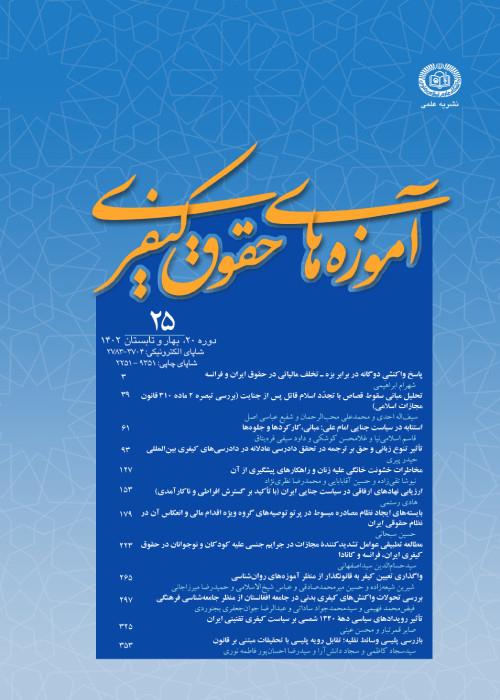Behavioral Economics and the Issue of the Perception of Punishment: From Choice architecture to Critique of Behavioral paternalism
Author(s):
Article Type:
Research/Original Article (دارای رتبه معتبر)
Abstract:
The use of cognitive and behavioral science considerations is an undeniable necessity for more accurate analysis of criminal behaviors and improving the deterrent function of punishments. The knowledge of behavioral economics, relying on cognitive and behavioral sciences considerations, shows that the capacity of human cognitive powers is limited and this limited capacity is also involved with a wide range of cognitive biases and errors. These variables cause criminals (potential delinquent) to perceive the reality of punishment in a distorted form in many cases, and distance themselves from the classical logic of rational choice theory in their decisions to commit a particular crime (or engage in criminal activity). The recognition of the effectiveness of these cognitive variables on the relative disturbance on free will and calculator will can help to determine preventive (deterrent) practical strategies and can help to measure the risk of recidivism more accurately. This article, by relying on descriptive-analytical method, is going to investigate the capacities and possible challenges of the practical use of these insights in the field of criminal policy as the perception of punishment. Behavioral economics based on psychological insights suggests the idea of “choice architecture” and “nudge theory”. This research shows that distortion of the reality of punishment can be prevented in the minds of criminals in some cases by relying on new insights of behavioral economics in the field of deterrence. In this regard, supporters (favoritism) of the idea of choice architecture claim that they can lead people to make a better choice in a “free-spirited” way. However, this idea is faced with important critiques and it has a reductionism error in many ways. It can be said, at least, that uncritical exposure to it can face policies and ideological plans of crime control.
Keywords:
Language:
Persian
Published:
Criminal Law Doctrines, Volume:19 Issue: 23, 2022
Pages:
297 to 330
magiran.com/p2566279
دانلود و مطالعه متن این مقاله با یکی از روشهای زیر امکان پذیر است:
اشتراک شخصی
با عضویت و پرداخت آنلاین حق اشتراک یکساله به مبلغ 1,390,000ريال میتوانید 70 عنوان مطلب دانلود کنید!
اشتراک سازمانی
به کتابخانه دانشگاه یا محل کار خود پیشنهاد کنید تا اشتراک سازمانی این پایگاه را برای دسترسی نامحدود همه کاربران به متن مطالب تهیه نمایند!
توجه!
- حق عضویت دریافتی صرف حمایت از نشریات عضو و نگهداری، تکمیل و توسعه مگیران میشود.
- پرداخت حق اشتراک و دانلود مقالات اجازه بازنشر آن در سایر رسانههای چاپی و دیجیتال را به کاربر نمیدهد.
In order to view content subscription is required
Personal subscription
Subscribe magiran.com for 70 € euros via PayPal and download 70 articles during a year.
Organization subscription
Please contact us to subscribe your university or library for unlimited access!


